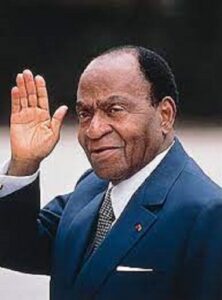
Félix Houphouët-Boigny
*Félix Houphouët-Boigny was born on this date in 1905. He was a Black African politician and physician.
Houphouët-Boigny was born in Yamoussoukro, the Ivory Coast, to a family of hereditary chiefs of the Baoulé people. His first name, Dia, means "prophet" or "magician." His father was N'Doli Houphouët. When N'Go was murdered in 1910, Dia was named to succeed him as chief. Due to his young age, his stepfather, Gbro Diby, ruled as regent until Dia came of age.
The French colonial administration recognized tribal leaders; they arranged for Houphouët to attend school at the military post in Bonzi, not far from his village, to prepare him for his future as a leader, despite strenuous objections from relatives, especially his great-aunt, Queen Yamousso. In 1915, he was transferred to a boarding school and converted to Christianity, christened as Félix. In 1919, he earned a teaching degree. In 1921, he attended the École de médecine de l'AOF, the School of Medicine in French Senegal, where he served as a medical assistant. As he never completed his medical studies, his mother, Kimou N'Dri (also known as N'Dri Kan), died in 1936.
Houphouët was a medical aide, union leader, and planter before being elected to the French Parliament in 1945. He served in several ministerial positions within the French government before leading the Ivory Coast following its independence in 1960. Throughout his life, he played a significant role in politics and the decolonization of Africa. Under his politically moderate leadership, the Ivory Coast experienced economic prosperity. This success, uncommon in poverty-ridden West Africa, became known as the "Ivorian miracle"; it was due to a combination of sound planning, the maintenance of strong ties with the West (particularly France), and the development of the country's significant coffee and cocoa industries.
However, reliance on the agricultural sector caused difficulties in 1980, after a sharp drop in the prices of coffee and cocoa. Throughout his presidency, Houphouët-Boigny maintained a close relationship with France and the administrations of Charles de Gaulle and Georges Pompidou. He was suspected of involvement in the 1987 coup d'état that removed Thomas Sankara from power in Burkina Faso and provided assistance to UNITA, a United States-supported, anti-communist rebel movement. Houphouët-Boigny maintained a firm anti-communist foreign policy, which resulted in, among other things, severing diplomatic relations with the Soviet Union in 1969 (after first establishing relations in 1967) and refusing to recognize the People's Republic of China until 1983. He re-established relations with the Soviet Union in 1986. In the West, Houphouët-Boigny was commonly known as the "Sage of Africa" or the "Grand Old Man of Africa." Félix Houphouët-Boigny died on December 7, 1993.
At the time of his death, he was the longest-serving leader in Africa's history and the third-longest-serving leader in the world, after Fidel Castro of Cuba and Kim Il Sung of North Korea. After his death, conditions in the Ivory Coast quickly deteriorated. Between 1994 and 2002, several coups occurred, the CFA franc was devalued, and an economic recession ensued; a civil war began in 2002.